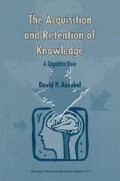Abstract
The significance of practice and drill in meaningful learning and retention has, in my opinion, been unwarrantedly ignored or downgraded (Gagné, 1962). In many educational circles drill is viewed pejoratively as the hallmark of rote learning. Practice is obviously less important, relatively speaking, in meaningful than in rote learning, because in the latter variety of learning, what is learned cannot be related nonarbitrarily to any ideas in the learner’s cognitive structure, and, thus, can only be retained beyond short periods of time by dint of much effortful repetition. Nevertheless, repetition is still a very significant variable that must be reckoned with if we are concerned with long-term meaningful learning and retention, and with transfer to related, sequentially dependent aspects of subject matter.
Access this chapter
Tax calculation will be finalised at checkout
Purchases are for personal use only
Preview
Unable to display preview. Download preview PDF.
References
Ash, P. The relative effectiveness of massed versus spaced film presentations. Journal of Educational Psychology, 1950, 41, 19 - 30.
Ashcroft, M. H. Human memory and cognition. New York: Harper Collins, 1994.
Ausubel, D. P. Early versus delayed review in meaningful learning, Psychology in the Schools, 1966, 3, 195 - 198.
Ausubel, D. P. Educational psychology: A cognitive view. New York: Holt, Rinehart, & Winston, 1968. Ausubel, D. P. Ego development and the personality disorders. New York: Grune & Stratton, 1952. Ausubel, D. P., & Youssef, M. The effect of consolidation on sequentially related, sequentially independent meaningful learning. Journal of General Psychology, 1966, 74, 355 - 360.
Briggs, L. J. Prompting and confirmation conditions for the learning tasks employing the subject matter terms. In A. A. Lumsdaine (Ed.), Student response in programmed instruction. Washington, D.C.: National Academy of Science—National Research Council, 1961.
Broadbent, D. E. Perception and communication. London: Pergamon Press, 1958.
Bumstead, A. P. Distribution of effort in memorizing prose and poetry. American Journal of Psychology, 1940, 77, 669 - 671.
Gagné, R. M. Military training and principles of learning. American Psychologist, 1962, 17, 83 - 91.
Harlow, H. E. The formation of learning sets. Psychological Review, 1949, 56, 51 - 65.
Hershberger, W. Self-evaluational responding and typographical cueing. Techniques for programming self-instructional reading materials. Journal of Educational Psychology, 1964, 55, 288 - 296.
Hirt, E. R., McDonald, H. E., & Erikson, G. A. How do I remember thee? The role of encoding, set, and delay in reconstructive memory processes. Journal of Experimental Social Psychology, 1995, 31, 379 - 409.
Kurtz, K. H., & Hovland, C. I. Concept learning with differing sequences of instances. Journal of Experimental Psychology, 1956, 4, 239 - 243.
Peterson, H. A., et al. Some measurements of the effects of reviews. Journal of Educational Psychology, 1935, 26, 65 - 72.
Peterson, H. R. Recitation or recall as a factor in the learning of long prose selections. Journal of Educational Psychology, 1944, 35, 220 - 228.
Sones, A. M., & Stroud, A. B. Review with special reference to temporal position. Journal of Educational Psychology, 1940, 31, 665 - 676.
Thorndike, E. L. Human learning. New York: Century, 1931.
Thorndike, E. L. The fundamentals of learning. New York: Teachers College, Columbia University, 1932.
Author information
Authors and Affiliations
Rights and permissions
Copyright information
© 2000 Springer Science+Business Media Dordrecht
About this chapter
Cite this chapter
Ausubel, D.P. (2000). Practice and Motivational Factors in Meaningful Learning and Retention. In: The Acquisition and Retention of Knowledge: A Cognitive View. Springer, Dordrecht. https://doi.org/10.1007/978-94-015-9454-7_7
Download citation
DOI: https://doi.org/10.1007/978-94-015-9454-7_7
Publisher Name: Springer, Dordrecht
Print ISBN: 978-90-481-5536-1
Online ISBN: 978-94-015-9454-7
eBook Packages: Springer Book Archive

